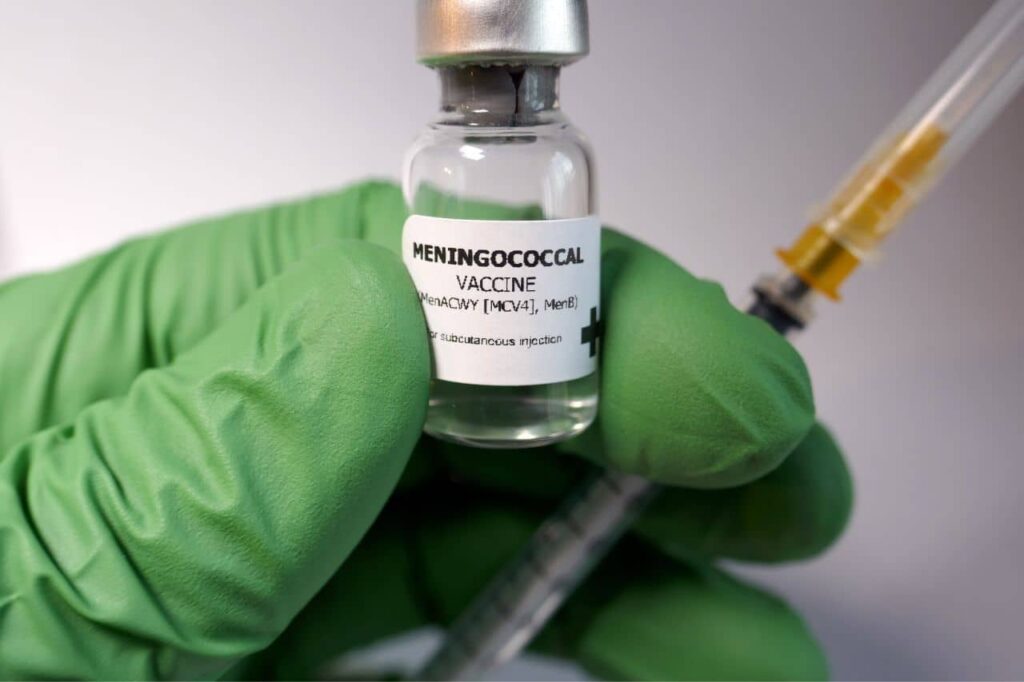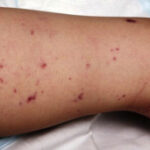Meningococcal vaccination plays a crucial role in preventing meningococcal disease, a severe bacterial infection caused by Neisseria meningitidis. This condition can lead to meningitis (inflammation of the brain and spinal cord membranes) and septicemia (blood infection), both of which can be life-threatening. Vaccination is the most effective way to prevent its spread and reduce mortality rates.

What Is Meningococcal Disease?
Meningococcal disease is caused by the bacterium Neisseria meningitidis, which spreads through respiratory droplets (coughing, sneezing, or close contact). It can lead to meningitis, sepsis, and organ failure if left untreated.
Symptoms of Meningococcal Disease
- High fever
- Severe headache
- Stiff neck
- Nausea and vomiting
- Sensitivity to light (photophobia)
- Confusion or difficulty concentrating
- Rapid breathing
- Cold hands and feet
- Dark purple rash (in severe cases)
Types of Meningococcal Vaccines
There are two main types of meningococcal vaccines:
1. Meningococcal Conjugate Vaccine (MenACWY)
- Protects against A, C, W, and Y serogroups
- Recommended for adolescents, college students, and military personnel
- Provides long-term immunity
2. Serogroup B Meningococcal Vaccine (MenB)
- Specifically targets serogroup B, which is responsible for many meningitis cases
- Recommended for high-risk individuals such as those with compromised immune systems or during outbreaks
Meningococcal Vaccine Schedule
The Centers for Disease Control and Prevention (CDC) and the World Health Organization (WHO) recommend the following schedule:
- Children and Adolescents:
- First dose of MenACWY at 11-12 years
- Booster dose at 16 years
- High-Risk Individuals:
- Infants and young children in outbreak-prone areas
- Travelers to meningitis-endemic regions (e.g., sub-Saharan Africa)
- People with immune system deficiencies
- College Students and Military Recruits:
- Required to get vaccinated due to high transmission risk
Effectiveness of Meningococcal Vaccination
Meningococcal vaccines provide 85-90% protection against severe infections. They have significantly reduced meningococcal disease cases in vaccinated populations. However, due to the constantly evolving nature of Neisseria meningitidis, booster doses are necessary to maintain immunity.
Side Effects and Safety
Meningococcal vaccines are safe and well-tolerated. However, mild side effects can occur, including:
- Pain or redness at the injection site
- Low-grade fever
- Fatigue or headache
- Muscle pain
- Rare allergic reactions (anaphylaxis)
Severe side effects are extremely rare and are outweighed by the benefits of vaccination.
Importance of Meningococcal Vaccination
- Prevents Life-Threatening Disease: Meningitis and septicemia can lead to brain damage, limb loss, or death.
- Reduces Outbreaks: Vaccination reduces transmission and protects entire communities.
- Travel Requirements: Some countries require meningococcal vaccination for Hajj pilgrims, students, and travelers.
- Herd Immunity: Protects individuals who cannot be vaccinated due to medical reasons.
Global Vaccination Efforts
- Africa’s Meningitis Belt: Mass vaccination campaigns have reduced cases by 99%.
- United States & Europe: Routine immunization programs have significantly lowered disease prevalence.
- WHO Recommendations: Continued research and vaccine development are crucial for eliminating meningococcal disease globally.
Meningococcal vaccination is a critical public health measure that saves lives and prevents severe complications. Following the recommended vaccine schedule, especially for high-risk groups, can effectively reduce the spread of this deadly infection. Speak with your healthcare provider to ensure you are up to date on meningococcal immunization.

